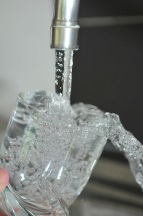Potable Water Program
 The Potable Water Program assists individuals whose private or publicdrinking water supply wells may be at risk of becoming contaminated or have become contaminated as a result of human activity. In these cases, the Remediation Division can investigate complaints relating to impacts to drinking water supplies under Connecticut General Statutes (CGS) Section 22a-471. If the source of the pollution can be determined, the Commissioner may issue an Order requiring the polluter(s) to provide potable water (short term) and to provide a long-term supply of potable water, which may include connection to a public water system or installation of a water treatment system.
The Potable Water Program also assists homeowners in evaluating well water testing results and provides guidance (in consultation with the Department of Public Health (DPH)) on available water treatment alternatives.
The Potable Water Program assists individuals whose private or publicdrinking water supply wells may be at risk of becoming contaminated or have become contaminated as a result of human activity. In these cases, the Remediation Division can investigate complaints relating to impacts to drinking water supplies under Connecticut General Statutes (CGS) Section 22a-471. If the source of the pollution can be determined, the Commissioner may issue an Order requiring the polluter(s) to provide potable water (short term) and to provide a long-term supply of potable water, which may include connection to a public water system or installation of a water treatment system.
The Potable Water Program also assists homeowners in evaluating well water testing results and provides guidance (in consultation with the Department of Public Health (DPH)) on available water treatment alternatives. DEEP’s Potable Water Program does not address naturally occurring contaminants in drinking water. In these cases, one should consult with DPH’s Private Well Program (860-509-8401) and the local health department for information and assistance with well water testing and/or water treatment options. To contact the Potable Water Program regarding drinking water well pollution resulting from human activity other than PFAS, contact the Remediation Division District Supervisor for the town the well is in. If a drinking water well is contaminated with PFAS, contact the DEEP Remediation Division PFAS Lead.
The Department is generally unable to provide bottled water to and/or install and maintain treatment systems at residential locations or at elementary or secondary schools with polluted wells. Limited funding is available, however, to provide bottled water and treatment systems to residential homes located in a DEEP Remediation Division PFAS investigation area. For more information contact the PFAS Lead at DEEP.PFAS@ct.gov or 860-424-3061.
Information for Well Owners
A clean source of drinking water is critical to your health. Approximately 23% of Connecticut's population relies on private wells as their source of drinking water but many do not know when to test their well, what to test for, or how testing is conducted. It is important to test your private well regularly to ensure the water quality is safe for you and your family. Many pollutants in drinking water go unnoticed, as they have no taste, odor, or color. Only laboratory tests can determine if they are present in your drinking water.
There are a variety of educational materials available to help Connecticut residents understand private well water issues:
CT Department of Energy and Environmental Protection Resources
- General Information on Groundwater
- Water Supply Well Receptor Guidance Document
- Residential Home Heating Oil Tanks - Protect your well water by properly maintaining your oil tank.
- Emerging Contaminants – Additional information on contaminants that are just beginning to be evaluated for health standards, such as 1,4-Dioxane, Perchlorate, Pharmaceuticals and Personal Care Products, and Nanomaterials
- Per- and Polyfluorinated Alkyl Substances (PFAS) Information for Private Well Owners
- Road Salt Investigations
- Road Salt FAQs
- Granular Activated Carbon (GAC) Systems for Private Wells - describes one treatment option for certain types of contamination in water supply wells
- Regulations Governing Grants to Municipalities
- Guidance Document For Evaluating Potential Hydrogeologic Impacts Associated With Blasting & Development Activities
CT Department of Public Health Resources
- Make your Private Well Water Safe - online tools guide residents on how to test, what to test for, and what to do if there is a problem (https://testyourwell.ct.gov/)
- DPH’s Private Well Program - general information, including three videos, about well testing
- Frequently Asked Questions About Drinking Water
- DPH Private Well Publications and Fact Sheets - Information on preventative maintenance, testing, various water treatments, and contaminants.
- Groundwater and Well Contamination - Information about private well testing and commonly detected chemicals.
- Your Local Health Department is a good source of information about well water testing.
- DPH Per- and Polyfluoroalkyl Substances (PFAS) - Health information, well treatment options, and CT approved labs for PFAS analysis.
- The Drinking Water Action Level List indicates common contaminants and the concentrations above which such contaminants may present a health risk to those who use private wells as a source of water for drinking, bathing, washing, or cooking
- List of Certified Laboratories
CT Department of Consumer Protection Resources
- Well Drilling - includes well drilling reports from 1970-present
US Environmental Protection Agency Resources
- Private Drinking Water Wells - General Information about drinking water from household wells
- Drinking Water From Household Wells
- EPA’s Drinking Water Standards and Regulations apply to states and public water systems. The Federal Maximum Contaminant Levels table provides standards for approximately 90 contaminants in drinking water.
- Emerging Contaminants of Concern Fact Sheet
If you need further information regarding man-made contaminants in drinking water please send inquiries to: DEEP.PotableWater@ct.gov.
Content Last Updated January 20, 2026

